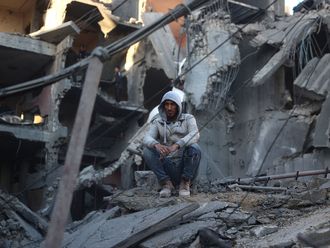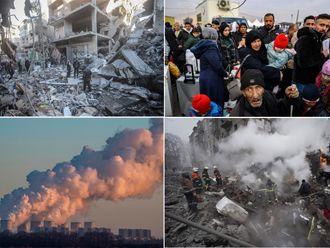
When the British, French and American governments used force against Syria earlier this month, they claimed they were acting to ensure respect for international law. Yet the use of force without the authorisation of the United Nations Security Council is contrary to the charter of the UN. There is something bewildering about violating international law in order to promote the enforcement of international law. If there is a taboo on the use of chemical weapons, why is there not also a taboo on the unilateral use of armed force, contrary to international law? Does one taboo trump the other?
That three nuclear powers express outrage about inhumane weapons has a ring of cynicism. Their conduct recalls that of tobacco companies howling about the health dangers of electronic cigarettes. Although couched in humanitarian language, the real motives of the United States, France and Britain may have more to do with protecting a monopoly on weapons of terror.
The use of chemical weapons in the Syrian civil war appears to be occasional and somewhat isolated, rather than systematic. In a conflict responsible for the deaths of 500,000 people, most of them civilians, the casualties from chemical weapons probably number in the hundreds. The use of chemical weapons is hardly the only serious violation of international humanitarian law to feature in the conflict.
Many categories of weapons are prohibited by specific treaties and declarations that form part of international law. The earliest such rule dates back exactly 150 years. The St Petersburg Declaration of 1868 condemned the use of exploding bullets. The pre-first world war Hague Conventions established that “the right of belligerents to adopt means of injuring the enemy is not unlimited”. They expressly prohibit “poison or poisoned arms”. After the 1914-18 war, British government lawyers prepared criminal charges against Kaiser Wilhelm II for the use of poison gas and “liquid fire” by German forces. A century later, lists of prohibited weapons include asphyxiating gas, cluster munitions, anti-personnel mines and blinding laser weapons.
Hollow shell
The International Court of Justice(ICJ) has affirmed a general principle prohibiting the use of any weapon that is inherently indiscriminate or that causes unnecessary suffering or superfluous injury. This formulation was incorporated into the Rome statute of the International Criminal Court, where the use of such weapons is labelled an international war crime. But the provision in the Rome statute is a hollow shell, a rhetorical device, a law without teeth. It adulterates the general principle by requiring that a list of such weapons appear in an appendix. There is no list. There is no appendix.
The general provision on indiscriminate weapons in the Rome statute insists they be listed specifically in an appendix because nuclear powers would never trust judges to interpret the phrase “inherently indiscriminate”. Judges might reach the not unreasonable conclusion that this term describes nuclear weapons. There is no list and no appendix because too many states resist the hypocrisy of condemning the “poor man’s weapons of mass destruction” while leaving untouched those of the rich man.
The Rome statute explicitly prohibits only three categories of weapons. It uses language and technology borrowed from another age: poison or poisoned weapons, asphyxiating, poisonous or other gases and expanding bullets. Moreover, in a further limitation, the 1998 text of the statute confines the prohibition on these weapons to international armed conflicts. Only in 2010 was the statute amended to extend the prohibition on the use of such weapons to non-international armed conflicts. But only 36 of the more than 120 members of the court have ratified these amendments. Britain and France are not among them. Some argue that the war crimes of use of “poison or poisoned weapons” and “poisonous gas” include chemical weapons of the type being used in the Syrian civil war. Whether this was the intent of those who drafted the Rome statute is a matter of controversy. When the statute was adopted, proposals to include an explicit ban on chemical weapons were rejected.
Nuclear arms explain the inadequacy of universally accepted legal rules governing prohibited weapons. They are the quintessential indiscriminate weapon. The unnecessary suffering and superfluous harm that they have caused, on the two occasions they have been used, dwarf the human toll attributable to chemical weapons in all conflicts over many centuries.
Citing the Treaty on Non-Proliferation of Nuclear Weapons , the ICJ recalled the obligation imposed on the nuclear powers to pursue in good faith and to conclude negotiations leading to nuclear disarmament. The nuclear powers consistently ignore this requirement. Yet it is a quid pro quo not only for the non-proliferation of nuclear weapons, it is also fundamental to the effective enforcement of a ban on chemical weapons. Only a principled approach to disarmament that addresses all weapons of terror and mass destruction in a consistent manner can succeed.
— Guardian News & Media Ltd
Professor William Schabas is professor of international law at Middlesex University in London.









